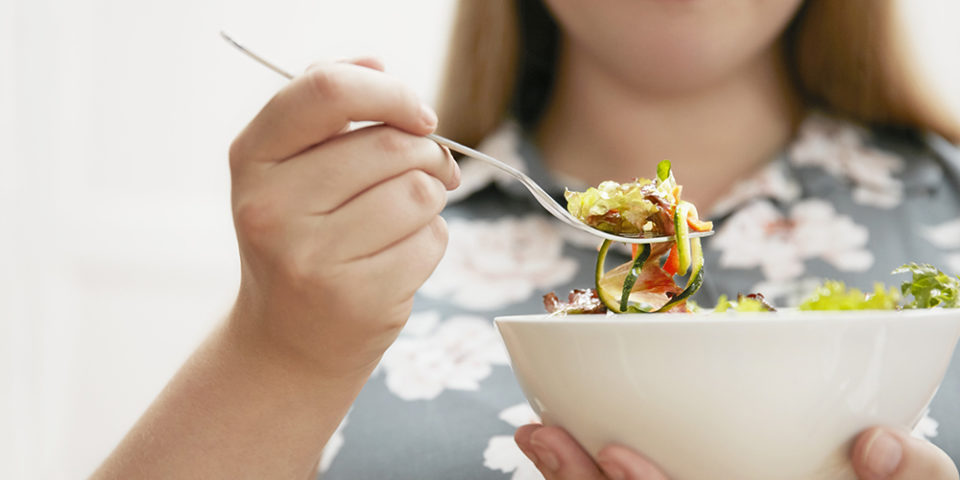10 tips for healthier eating habits after weight-loss surgery
Anyone who has undergone bariatric weight-loss surgery knows that the changes go far beyond the surgical recovery. Not only what you eat or how much, but also how you eat can greatly influence whether your weight loss journey is successful in the long-term. Meredith Fuson-Hill, RDN, offered ten tips for healthier eating habits after weight-loss surgery.
1. Keep timing top of mind
“After bariatric surgery, one big change that is really important is separating your intake of food and fluids,” said Fuson-Hill.
She suggested sticking with the 10/20/30 rule for timing. Ten minutes before you eat, stop drinking any fluids. Spend about 20 minutes eating your meal, pausing between bites and stopping when you feel satisfied. When you finish, note the time and then wait for 30 minutes before you drink any more fluid.
2. Chew your food thoroughly
“This is immensely important,” said Fuson-Hill. “Your stomach cannot break down food itself as effectively after weight-loss surgery.”
Be sure to chew every single bite until it is the consistency of applesauce. Don’t try to focus on chewing a specific number of times – different types of food will take longer to chew than others.
3. Don’t wait to feel hunger
“After bariatric surgery, you can’t rely on hunger cues or appetite to tell you when to eat,” said Fuson-Hill. “Instead, you’ll need to do what we call ‘eating according to the clock’.”
When it comes time for a meal or snack, don’t skip it if you ‘don’t feel hungry’ yet. Instead, try to eat at least a little something. If, after a bite or two, you can’t eat any more, put the food away and wait for the next meal or snack time.
Don’t graze or keep trying to eat after that.
4. Plan out what you’ll eat ahead of time
“Ever heard the saying, ‘fail to plan and you’ll plan to fail’? I heavily encourage anyone who has undergone bariatric surgery to embrace planning ahead when it comes to eating,” said Fuson-Hill.
Not only will planning ahead help you to stay on track with eating healthier options and making it easier to stick to your schedule and dietary needs, but it will also help you save money and cut down on those unscheduled drive-thru trips or ordering delivery.
Meal prep or complicated menu-planning isn’t for everyone, but just giving yourself a few minutes to think about what activities or plans you have in the coming week and noting how to work your meals and snacks into that schedule can help.
5. Write down what you eat and when
“Keeping a record of what you’ve eaten can really be of great benefit, especially early on as you’re getting used to your ‘new normal’ after bariatric surgery,” said Fuson-Hill.
Writing down what you consumed, how it was prepared, where you ate, and why can help you identify potential issues such as food aversions, overeating episodes, emotional triggers for eating or other barriers that might stand in the way of weight-loss success.
6. Toss out what isn’t working
“It can be hard to toss out the junk food we might have accumulated or those trendy ‘fitness foods’ we bought that we just didn’t like or never got around to eating,” said Fuson-Hill. “But ‘out of sight, out of mind’ is a saying for a reason and it’s important to make sure what you see is what you can and want to eat.”
Don’t feel like you have to hold onto food you’ve already purchased if it doesn’t nourish your body or provide any kind of real enjoyment during eating. Be very selective in your choices about what food and beverages you keep in your house, and it’ll be easier to stick to your plan to achieve health.
7. Don’t eat while distracted
“This is especially important in those initial stages after surgery, as you’re still getting a feel for what your body is capable of taking in, how much and how to know when to stop.”
Make sure the TV is off, you’re not on the phone, don’t scroll on social media … remove any and all distractions during mealtime. While you’re eating, just eat!
8. Take your time – and taste your food
“This is a piece of advice I’d give just about everyone, whether they’ve had weight-loss surgery or not,” said Fuson-Hill. “It’s easy in fast-moving modern life to eat quickly and without paying attention to the process of eating, but food is meant to be enjoyed!”
Eat slowly, chewing carefully and savoring the flavor of your food. Don’t shy away from strong seasoning, if that’s what you prefer, and don’t worry if it’s ‘just right’ as far as fat and calories per serving. Research shows that chewing more slowly and savoring tastes and textures at mealtime leads to smaller portion sizes being consumed.
9. Try something new!
“I definitely suggest people who have had bariatric surgery make sure they’re open to new foods, flavors and tastes,” said Fuson-Hill. “Our tastes often change after surgery, and you may not enjoy the same foods you did before.”
Plus, trying new things will help remind you to eat more slowly. You may find that you like flavors you never did before and enjoy the act of eating rather than simply trying to ‘finish’ the meal. This can help you with building healthier eating habits after weight-loss surgery.
10. Remember, this isn’t a diet – it’s a total lifestyle change
“Bariatric surgery and weight-loss surgery in general has this incorrect reputation as some kind of ‘quick fix’ to problems with losing weight,” said Fuson-Hill. “The truth is that bariatric surgery involves changing everything about your previous lifestyle and it’s not easy, simple or quick.”
There is a learning curve involved, and everyone has a stumble here or there. Be patient with yourself if you struggle with occasional issues with overeating even after surgery, or if you’re not sure where to begin with changing your foods.
Check in routinely with your dietitian to discuss your current diet, what might need to change, and what steps you can take to build healthier eating habits after weight-loss surgery.
Find the care you need, close to home
Our primary care physicians provide well visits and everyday care when you need it with compassion and expertise.
Find Primary Care Near You

